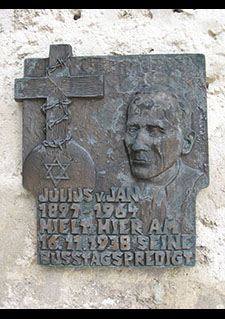Sermons against the November Pogrom
When Jews were maltreated, hauled off to concentration camps and murdered, when their property was destroyed and their temples were torched in the night of November 9 to 10, 1938, the Protestant church governments remained silent.
The Confessing Church was unable to manage a protest. At its Church Congress from December 10 to 12, 1938, it merely declared its belief in the equality of all people before God and appealed to congregations to minister to the physical and emotional distress of their Christian brothers and sisters among the Jews.
Although Theophil Wurm, bishop of the Württemberg regional church, protested in writing to the Reich Minister of Justice against the way action was being taken against the Jews, only a tiny minority of pastors and laity publicly raised its voice against the crimes of the November Pogrom.
Karl Immer, a pastor in Barmen, appeared before his congregation without his robe on the Sunday after the pogrom and explained he was unable to preach after the word of God had been burned not far away. Instead, he read aloud the parable of the Good Samaritan. Pastors in Nuremberg assembled in St. Lawrence’s Church in order to recite the Ten Commandments aloud as a sign of protest.
Hermann Maas, Heidelberg city pastor, expressed his solidarity to individual victims and declared he wanted to help them not although but because they were Jews. According to the historian Gerhard Ritter, the outrage at the burning of synagogue in the newly constituted Freiburg Circle raised the question of the church’s duty to make a public statement.
The pastors Helmut Gollwitzer and Julius von Jan’s sermons for the day of penance on November 16, 1938 especially stand out among the few church protests.
In his sermon, Gollwitzer, a member of the Old Prussian Council of Brethren and a pastor of concentration camp inmate Martin Niemöller’s congregation in Berlin-Dahlem, decried that upright people had turned into dreadful beasts and that Christians as well as non-Christians, driven by such base instincts as hate and revenge, had become so guilty by being complacent and looking away that God was repulsed by them. Gollwitzer’s fiery sermon led to an appeal to minister to the victims of persecution unconditionally: Outside waits our neighbor, destitute, defenseless, dishonorable, starving, hunted and driven by fear for his very life.
Julius von Jan, a Confessing Church pastor in Oberlenning, openly acknowledged the crimes as such in his sermon: The passions are unleashed, God’s commandments scorned, temples that were holy have been burned down with impunity, strangers’ property robbed or destroyed, men who loyally served our German nation and faithfully did their duty have been thrown into concentration camps just because they were members of another race! […] We as Christians see how this injustice indicts our nation before God and must bring his punishment over Germany.
In a sensational action by Nazi party members a few days later, Julius von Jan was brutally beaten up, dragged off to Gestapo detention and expelled from Württemberg; in 1939, he was sentenced to sixteen months of prison in a degrading trial. He was not able to return to his to his congregation in Oberlenning until 1945.
Source / title
- ©Photo: U. U. Graf, Oberlenningen; Audio recording of: Theodor Dipper: Die Ev. Bekenntnisgemeinschaft in Württemberg 1933-1945 (AGK. 17), Göttingen 1966, p. 263ff.

